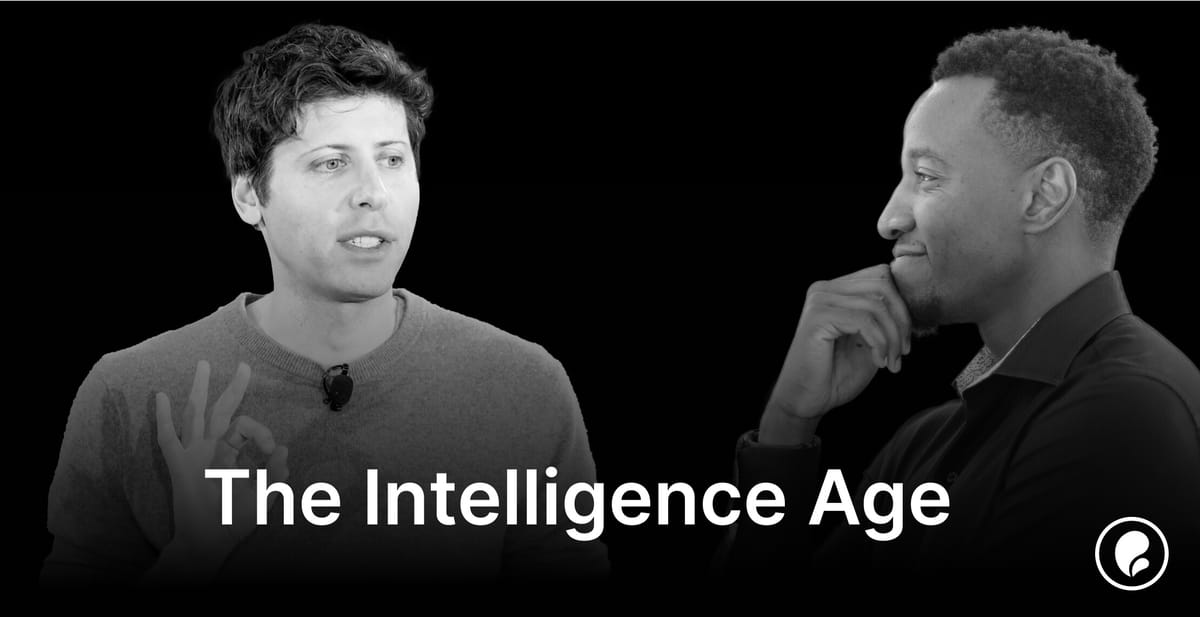
In a post on his personal blog, OpenAI CEO Sam Altman painted a very optimistic picture of humanity's future with AI and a road toward unprecedented human capability and prosperity. Here is a link to his post in it's entirety, I highly encourage you to read it.

Ethan Mollick called it a victory lap, but questioned whether it was premature. TechCrunch called it speculative.
I call it conviction.
Whether you see this as hubris, techno-utopia fodder, or prophecy from the annointed one of things to come, one thing is certain; Altman is going all in on his vision.
In Altman’s own words “The dawn of the Intelligence Age is a momentous development with very complex and extremely high-stakes challenges.”
If we truly desire the future Altman envisions—and why shouldn’t we?—we must do more than just hope. We need to take agency, committing as many resources as we can to reach for this future. And, while our ambitions must be grounded in reality and we must strive to minimize potential harms, we should also unbridle our imagination and dream of greatness.
Below I'd like to call out some parts of his article that stood out to me, and share some of my own thoughts on the Intelligence Age.
Collective Intelligence
Firstly, I loved that Altman began by highlighting the collective nature of innovation and human progress:
We are more capable not because of genetic change, but because we benefit from the infrastructure of society being way smarter and more capable than any one of us; in an important sense, society itself is a form of advanced intelligence. Our grandparents – and the generations that came before them – built and achieved great things. They contributed to the scaffolding of human progress that we all benefit from. AI will give people tools to solve hard problems and help us add new struts to that scaffolding that we couldn't have figured out on our own.
This is important for us to acknowledge. We need each other—more than we often like to admit. Caesar said it right "Ape alone... weak. Apes together... strong."
Importantly, progress, even in the intelligence age, is not a zero sum game. I do not believe that any one individual, company or country will own a singular AI that controls the entire world.
The duality of AI is such that, on one hand, it does not exist in a vaccum. It too, relies on the "scaffolding" of other technologies and innovations. Think of the deep learning technology that Sam pointedly calls out as the "secret" behind the breakthroughs we are making with AI. Then, consider all the other technologies and advances that were necessary to facilitate it: e.g. electricity, GPUs, the internet, software, math, language, and all the datsa we've created and collected over time. At the same time, as AI becomes more capable, like any other intelligence, it will shape the very scaffolding it is built on, and ultimately, it will shape itself. So too will humans.
AI Literacy and the Future of Work
Now, Altman is candid about the challenges ahead, particularly regarding the labor market:
...we expect that this technology can cause a significant change in labor markets (good and bad) in the coming years, but most jobs will change more slowly than most people think, and I have no fear that we'll run out of things to do (even if they don't look like 'real jobs' to us today).
However, I slightly disagree with his take here. Yes, there is plenty of work to do and we likely don't have to worry about running out of work any time soon. And yes, most jobs may change more slowly than most people think - but there are two very important caveats:
- First is the types of jobs that are being disproportionately affected—knowledge work. While the work itself may largely remain the same, the processes and workflows that were relevant yesterday are quickly becoming obsolete. AI literacy levels are lagging behind.
- This comes more into focus when you think of the impact of knowledge work on leading economies like the US. Ultimately, there isn't a sector or industry that AI won't significantly affect.
We must prioritize AI literacy and invest heavily in upskilling programs. Individuals, businesses, and governments all have a role to play in preparing the workforce for collaboration with intelligent systems.
Prosperity All Around?
If a lamplighter could see the world today, he would think the prosperity all around him was unimaginable. And if we could fast-forward a hundred years from today, the prosperity all around us would feel just as unimaginable.
While I do not doubt Altman's intentions, as a successful multi-billionarie, his perspective is very different from the lived experience of the majority of people on the planet. That is not meant to be criticism, just an acknowledgement of his accomplishments and how that affects how he sees the world.
Altman's lamplighter analogy captures this perfectly. You see, even back then, there was also unimaginable prosperity all around the lamplighter, they just didnt have access to it.
And, yes, I've seen the data...I do not disagree that there is much more prosperity around us especially compared to previous centuries. However, there is also still unimaginable poverty, violence, inequity, and systemic injustices that persist globally.
You see, despite significant progress in areas such as healthcare, education, and infrastructure, millions remain marginalized and suffering—lacking access to basic necessities and facing daily struggles for survival.
So Altman's analogy only holds true if the lamplighter is lucky enough to spawn in the right zip code. But let's be honest, would they think the same think if they were to respawn in South Sudan, Israel, Ukraine, Lebanon, Haiti, Gaza, on our southern border, Iran, North Korea, or the wrong street in Chicago or San Francisco?
That right there is the big fucking problem that we have to solve as a species—the distribution of resources and opportunities.
Will AI solve that? How? What are we doing today to get closer to that future.
So, if we fast forward a hundred years, our measure of success cannot just be that the "prosperity all around us feels unimaginable". This prosperity needs to be accessible and widely distributed.
But, let me be clear, I don't expect Altman or OpenAI to solve this problem—and neither should you.
Remember what we started with, collective intelligence? As a society, we all play a role in building the world our children will inherit—through our actions and inaction. OpenAI is playing their part, innovating at the technology layer. What are you doing?
Anyways, enough rambling. I read Sam's words and I am excited about his focus and conviction. I think about the work that Maginative is doing around AI literacy and the impact we can make if we do it right. If you did read it, I do hope that it can serve as a rally cry if you're still on the sidelines to get involved.
There is a LOT of work to do, and lots of opportunities to build businesses around products and services that add value.
In 2 words: Let's goooo!


